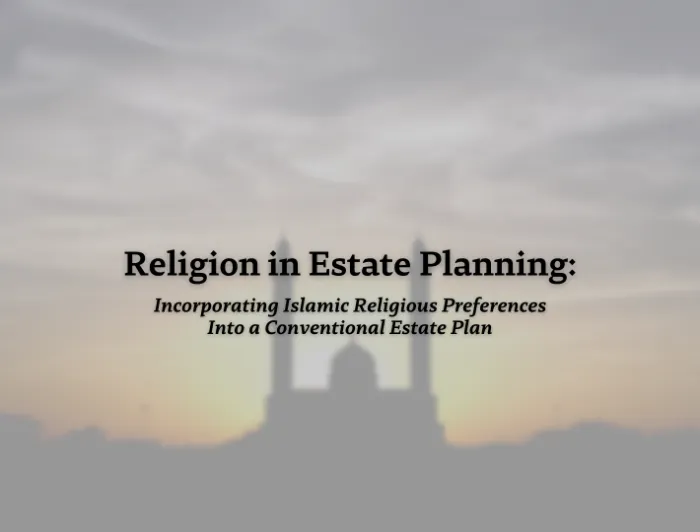This month, Managing Attorney Yaser Ali published his latest article on Islamic estate planning, discussing the creation and design of sharia-compliant estate plans for Muslim clients seeking to integrate unique religious preferences into conventional trust-based plans.
Check out the introduction below followed by a PDF of the full text:
For most clients, tax planning is not the primary reason they consult with an estate planning attorney, especially in light of Congress’ decision not to reduce the high estate tax exemption amounts. Rather, clients are typically motivated by a variety of considerations other than taxes, including a desire to protect their family, to provide an orderly administration of their assets, to avoid probate and interfamily disputes, and to engage in incapacity planning. Each client has unique goals that are dictated, or at least motivated in part, by the client’s experiences, values, and beliefs. Being able to design a custom plan that acknowledges and addresses these experiences, values, and beliefs is a core function of an effective estate planning attorney.
Often, a client’s religious faith influences many crucial estate planning choices, such as health care preferences; end-of-life care decisions; the decision about whether to leave charitable bequests and, if so, to whom; and the approach to use for the ultimate distribution of assets. While many practitioners are often reluctant to bring up issues of religion, given their sensitivity, the impact of religious views on a client’s estate planning objectives makes acknowledging religion’s impact inescapable for attorneys who represent clients of various faiths.
Our practice is concentrated on providing estate planning services to Muslim clients who are seeking to integrate aspects of Islamic law into their estate plans. Many of the clients who contact us do so after having a frustrating experience with another attorney who was unable or unwilling to incorporate the client’s religious preferences into their documents.
This article is intended to assist the practitioner in designing an estate plan that achieves a Muslim client’s wishes by introducing readers to a Muslim client, providing an overview of the faith and the applicable components of Islamic inheritance law, and outlining specific estate planning considerations that follow from Islamic law.
